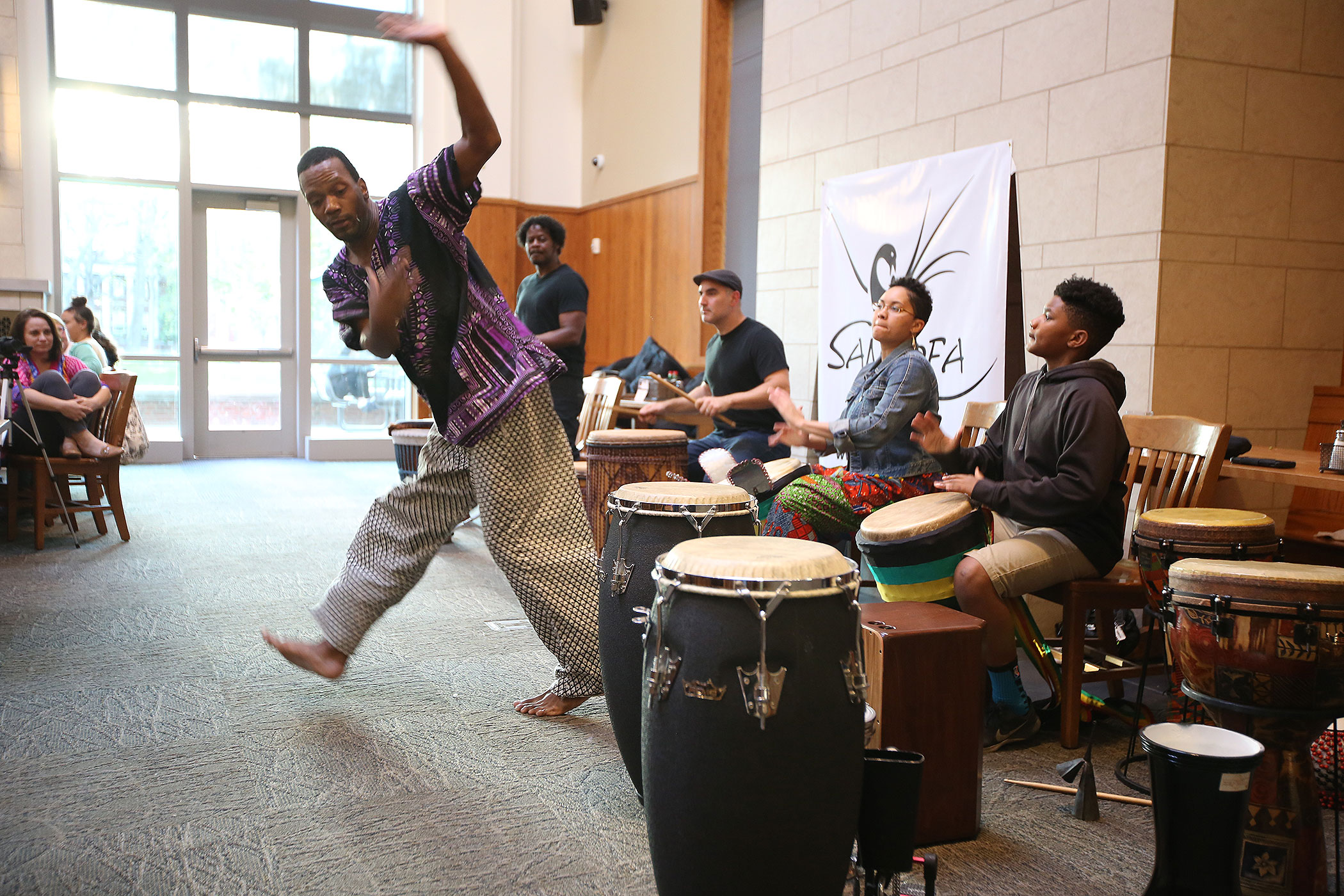Home » News » Africa Week Initiatives: Raising Awareness
Africa Week Initiatives: Raising Awareness
Posted by anderc8 on Friday, May 5, 2017 in News, TIPs 2016.
Written by Vanderbilt freshman Vocal Performance major Michelle Langone
I am always amazed by the ways Vanderbilt implements various methods to capitalize on educational opportunities. During Africa Week, students were exposed to impactful subjects that are not always discussed, bringing important issues to the forefront through a series of events. On the first day, I attended a lecture on non-communicable diseases in sub-Saharan Africa and a Sory Diabate drum performance. Later in the week, I went to a lecture about Winnie Madikizela-Mandela and her impact on the anti-apartheid movement, as well as a film screening on Eritrean refugees.
The lecture on non-communicable diseases was extremely eye-opening for me. We tend to focus on communicable diseases such as the HIV epidemic, but fail to realize the impact of non-communicable diseases like cancer, diabetes and heart disease. It seems illogical that we would overlook such prevalent diseases, but we often do when discussing this region of the world. The lack of access to health care has made it almost impossible for people to seek proper treatment—one video showed a woman who crossed the border of Kenya to Uganda by herself to receive cancer treatment. We discussed doctor-patient interactions in these overburdened, under-financed free health care facilities, examining subjects like the expression of pain in African countries. Patients often undergo procedures without the proper dosage of painkillers, simply because there is a lack of funding to provide them – they endure extreme pain and suffer silently. As someone who Googles symptoms almost immediately at the slightest pinch or pang, this notion bewildered me. Undergoing that level of pain while the means to repress it exists in other places, is inhumane and reprehensible. I have always firmly believed that everyone has the right to health, or access to necessary healthcare to achieve health, depending on the circumstance. However, many places lack the institutions to fulfill this right, for a myriad of reasons including a lack of resources, faulty structural design, geographical setbacks, governance and established policies. This lecture prompted me to think about global health from a larger perspective, trying to conceive ways to correct this plight.

As a music major at the Blair School, I thoroughly enjoyed the Sory Diabete performance. Not only was it extremely entertaining, it was also interactive. Last semester, in my global music class, I learned some elements of African music that I was able to pinpoint in this performance. These elements included heavily syncopated rhythms, the incorporation of polyrhythms (multiple rhythms played simultaneously), the use of percussive instruments and the body – to create sound and the call-and-response technique, in which the main percussionist would play a rhythm and the audience members mimic it on our laps, clap it or sing it out loud. I loved the energy and excitement that the performers emanated. They made me want to get up and dance. Even though I always joke about having no rhythm, especially in the context of fulfilling my rhythmic dictation exercises in my musicianship courses at Blair, I definitely felt the groove of the drums, and I couldn’t help but clap and tap my feet. This event showed me how the best music is always a communal event, reminding us of our shared human experiences.
Transitioning from the energetic and light-hearted drum performance to the lecture on the legacy of Winnie Madikizela-Mandela was profound as the lecture focused on the forms of torture she endured while imprisoned by the government. These included solitary confinement, sleep deprivation and inhumane, unsanitary living conditions – all culminating in mental deterioration. However, she remains a stunning hero to the anti-apartheid movement and her role as a woman, which influenced her forms of punishment, resonates to all who know her story. Depicting extreme strength and perseverance throughout her marriage to Nelson Mandela, her torture and imprisonment, and her commitment to the revolution – this lecture was riveting. The fact that people like Winnie Mandela exist in the world – people with such irrevocable strength of character and willpower that is maintained against all odds – is inspiring. People like her and her husband, those who believe in a cause and will stop at nothing to achieve it, are the ones who truly make a difference. They are no strangers to controversy or peaceful transitions, but they press on and are the mechanisms of positive change in the world.
During Africa Week, I also watched a film documenting the plight of the Eritrean refugees. The film highlights the country’s relative obscurity on the world stage. The people there will stop at nothing to make sure the world is informed, encouraging viewers to become involved in the issues. The film discussed how the Eritrean people are fleeing their home country’s repressive government. These refugees have no place to call home. They suffer in camps with virtually no resources and face extreme dangers. Children cross borders to get to the camps, risking being shot on the spot. The situation is dire. The movie gives a voice to an oppressed group of people, in turn education more people on the issue.
The events I experienced during Africa Week were enlightening, to say the least. I now feel more aware of the world outside my own, and am looking for ways to help. Becoming more educated on these issues was a positive first step.
